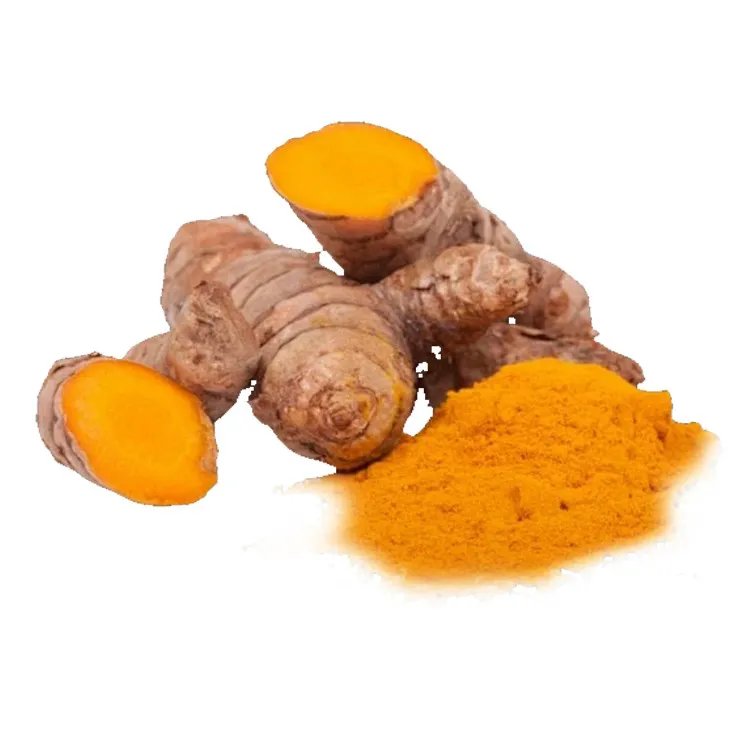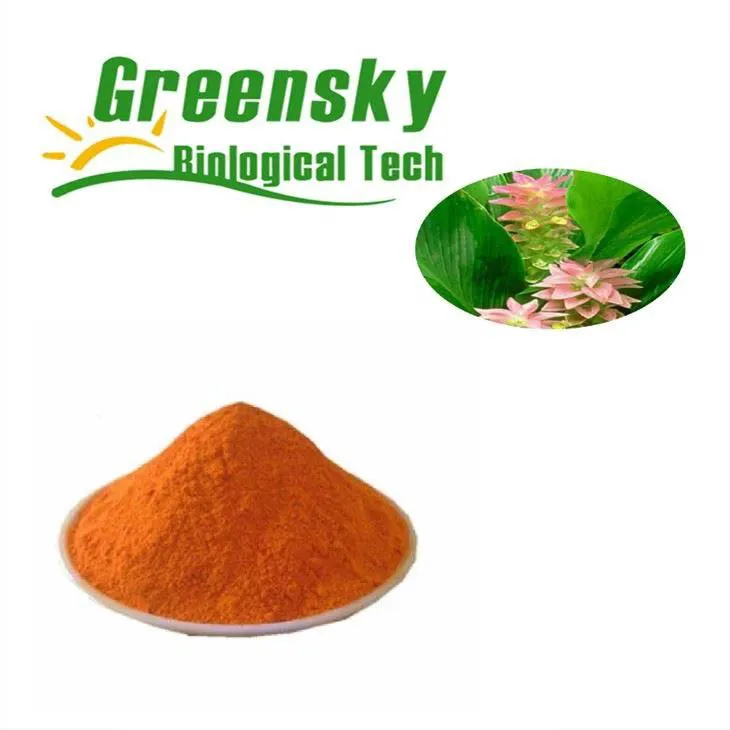- 0086-571-85302990
- sales@greenskybio.com
Are there any negative effects of curcumin?
2025-08-26

Curcumin, the active compound found in turmeric, has garnered widespread attention for its potent antioxidant and anti-inflammatory properties. Used for centuries in Ayurvedic and traditional medicine practices, Curcumin is celebrated for its potential to support health and alleviate various conditions. Despite its numerous benefits, there are potential negative effects associated with Curcumin consumption that warrant attention, particularly for individuals considering high-dose supplements. This article explores these potential side effects, their underlying mechanisms, and guidelines for safe use.
Understanding Curcumin: A Brief Overview
Curcumin is a bright yellow compound derived from the root of the turmeric plant (Curcuma longa), commonly used as a spice in cooking and as a natural coloring agent. In addition to its culinary uses, curcumin has been extensively studied for its therapeutic effects, including its role in reducing inflammation, combating oxidative stress, and supporting cognitive and cardiovascular health.
Despite the wide array of benefits, curcumin's impact on health is not solely positive. Scientific advancements have led to the identification of potential negative effects, particularly concerning high doses or prolonged use.

Potential Negative Effects of Curcumin
While curcumin is generally well-tolerated, certain negative effects may manifest, particularly under specific conditions or when consumed in excessive amounts. These include:
Gastrointestinal Issues: One of the most common side effects reported with high doses of curcumin is gastrointestinal discomfort, including nausea, diarrhea, and stomach cramps. These effects might be exacerbated by curcumin's ability to stimulate bile production, which can irritate the digestive system.
Blood Thinning: Curcumin has anticoagulant properties, which can enhance blood thinning effects. This poses potential risks for individuals taking blood-thinning medications like warfarin, increasing the likelihood of bruising or bleeding.
Gallbladder Concerns: Due to its bile-stimulating effects, individuals with gallbladder disease or gallstones should exercise caution when consuming curcumin. Its ability to affect gallbladder contractions might aggravate existing conditions.
Liver Function: Although research on curcumin's impact on liver function is limited, excessive consumption has been suggested to potentially stress liver detoxification pathways, particularly when combined with other medications, leading to liver damage or impairment.
Allergic Reactions: Although rare, some individuals may experience allergic reactions to curcumin, exhibiting symptoms like rash, hives, or anaphylaxis. This highlights the importance of monitoring reactions to new supplements.
Hormonal Effects: Curcumin has been noted to impact hormonal balance, particularly in sensitive individuals or those with hormone-related conditions. It may interfere with estrogen levels or affect thyroid function, necessitating careful attention for those with thyroid disorders or hormone-sensitive cancers.
Interactions with Medications: Curcumin can interact with various medications, potentially altering their efficacy or side effects. This includes certain cancer drugs, diabetes medications, and chemotherapy agents, emphasizing the importance of consulting healthcare providers before introducing curcumin supplements to existing regimens.

Risk Factors and Population Considerations
Several factors can increase the likelihood of experiencing negative effects related to curcumin:
High-Dose Supplements: The majority of negative effects are linked to high doses of curcumin supplements. Dietary consumption through turmeric as a spice typically does not cause adverse effects, highlighting the difference between natural intake and concentrated extracts.
Underlying Health Conditions: Individuals with pre-existing conditions such as gallbladder disease, bleeding disorders, or hormone-related issues are at greater risk of side effects and should be particularly vigilant when consuming curcumin.
Medication Interactions: Those on prescription medications should discuss potential interactions with healthcare providers, as curcumin can influence the metabolism and efficacy of various drugs.
Sensitive Populations: Pregnant and breastfeeding women should exercise caution with curcumin supplements due to limited research on their safety in these groups. Children and older adults may also exhibit increased sensitivity to certain effects.

Guidelines for Safe Use
Despite potential negatives, curcumin remains a valuable health-promoting compound when used appropriately. Consider the following guidelines to mitigate adverse effects:
Consult Healthcare Providers: Prior to starting curcumin supplementation, especially for high doses, consulting healthcare professionals is essential. This ensures compatibility with existing health conditions and medications.
Moderate Consumption: Opt for culinary use of turmeric where possible, incorporating it naturally into diets rather than relying heavily on concentrated curcumin supplements.
Monitor Reactions: Keep a record of any adverse reactions experienced when taking curcumin, adjusting doses or removing products as necessary.
Choose Quality Supplements: For individuals seeking supplements, selecting high-quality, third-party tested products ensures potency and safety, preventing exposure to contaminants.
Understand Dosage Recommendations: Follow appropriate dosage guidelines for curcumin supplements, avoiding excessive consumption that could lead to negative effects.

Current Research and Conclusions
Continued research into curcumin helps clarify its role in health, illuminating both positive and negative effects. Despite potential side effects, many studies affirm curcumin's therapeutic benefits in managing inflammation, oxidative stress, and chronic diseases.
As scientific understanding deepens, the development of formulations that enhance curcumin's bioavailability without triggering adverse effects presents a promising avenue. Researchers aim to refine extraction methods and explore synergistic ingredients that optimize benefits while reducing risks.

Conclusion: Navigating the Complexities of Curcumin
Curcumin remains a potent natural compound with a wide range of health benefits. Understanding its potential negative effects empowers individuals to make informed choices and safely harness its therapeutic potential. By adopting a thoughtful, moderated approach to curcumin consumption, and leveraging insights from healthcare providers and ongoing research, individuals can enjoy the benefits of this remarkable compound while minimizing any adverse outcomes. Awareness, education, and proactive health strategies are key to optimizing curcumin use as a valuable component of modern wellness philosophies.
Green Sky Bio provides the best extracts and supplements. It is a Chinese self-developed brand that is trustworthy! Welcome to email us to inquire about our products.
- ▶ Hesperidin
- ▶ citrus bioflavonoids
- ▶ plant extract
- ▶ lycopene
- ▶ Diosmin
- ▶ Grape seed extract
- ▶ Sea buckthorn Juice Powder
- ▶ Beetroot powder
- ▶ Hops Extract
- ▶ Artichoke Extract
- ▶ Reishi mushroom extract
- ▶ Astaxanthin
- ▶ Green Tea Extract
- ▶ Curcumin Extract
- ▶ Horse Chestnut Extract
- ▶ Other Problems
- ▶ Boswellia Serrata Extract
- ▶ Resveratrol Extract
- ▶ Marigold Extract
- ▶ Grape Leaf Extract
- ▶ blog3
- ▶ Aminolevulinic acid
- ▶ Cranberry Extract
- ▶ Red Yeast Rice
- ▶ Red Wine Extract
-
Mangosteen extract powder
2025-08-26
-
Aminolevulinic acid
2025-08-26
-
American Ginseng Root Extract
2025-08-26
-
Tongkat Ali Extract Powder
2025-08-26
-
Panax Ginseng Leaf Extract
2025-08-26
-
Giant Knotweed Extract
2025-08-26
-
Mulberry leaf Extract
2025-08-26
-
Ivy Extract
2025-08-26
-
Lily extract
2025-08-26
-
Marigold Extract
2025-08-26





















